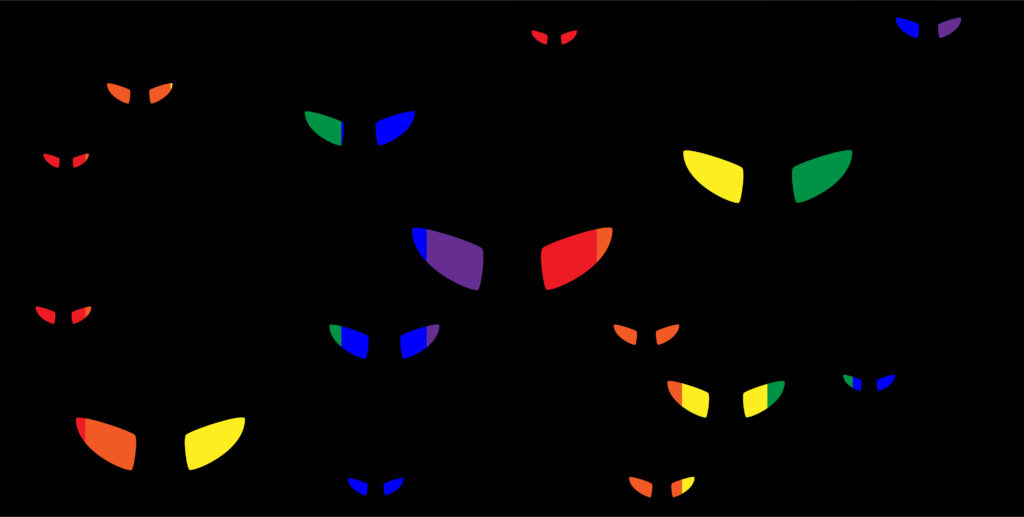Editor’s Note: This essay includes certain slurs to illustrate the prevalence of homophobia in America during the 1980s. Asterisks have been used within these words.
At Lincoln High School, in Stockton, California, in the mid-1980s, a bevy of football players patrolled the boundaries of taste and pleasure and issued verbal sanctions for any behavior they deemed transgressive. So, in 1984, when my friend Dean handed me an oil-pastel portrait of Boy George, lead singer of Culture Club, I knew the picture was worth at least a thousand words. “It’s fantastic!” I said. “You don’t want it?” He shook his head and smiled. Dean then held my English binder steady while I slid the picture beneath its transparent cover and tapped its top edge into place. Like border collies (minus the discerning intellect), the patrol hounded me back toward the middle, with curses of “Fa**ot!” or “You f*g!” Their acronymic creativity included “Got AIDS yet?” and “Adios, infected dick sucker!” and coincided with early reports in Rolling Stone about a mysterious virus spreading in San Francisco.
But the heart wants what the heart wants, and my heart beat for the rigid rhythm schemes of Blancmange, New Order, and Bronski Beat. With Bronski Beat, that vein was wide enough for two tracks, “Why” and “Smalltown Boy,” and lasted for decades. Masked man Orville Peck, with his swinging Western cover of “Smalltown Boy,” as part of Spotify’s Pride Single Series, reminds us of the song’s enduring celebration of difference and departure.
In fall 1982, I entered Lincoln as a closeted new waver, hesitant to unfurl my freak flag at school, where the esteem for cheerleaders in acrylic sweaters and polyester skirts, football players in their jerseys on home-game Fridays, and chrome-trimmed muscle cars had prevailed, undisturbed, since the late 1950s. In fall 1983, New Romanticism took hold on MTV, and I followed suit. I abandoned my earth-tone attire for pastel shirts by Chaps Ralph Lauren, thrift-store cardigans, and glacier-blue Top-Siders. In fall 1984, that shade of blue graced the cover of Bronski Beat’s The Age of Consent. The album’s title appeared in large, white typeface across a composition of a yellow square, blue circle, and a massive pink triangle. A few of my classmates recognized the symbol of gay pride. I did not. Years later, I learned that “age of consent” referred to England’s criminalization of homosexuality as “gross indecency” — a statute that remained on the books well into the 21st century.

I was certainly thrilled by the prospect of culture and style as consent (rather than descent). I was equally thrilled by Bronski Beat’s “Why,” which opens with six of the most insistent syllables in the post-punk era: Jimmy Somerville delivers a falsetto blast of “Tell me why! / tell me why!,” his voice trembling through the tail of the reprise. A glass shatters. A pregnant pause follows and, when the drums and the Yamaha DX7 break that tension, the song arrives completely, immediately, as if you were a few seconds late entering the club, and all your mates have already beat you to the heart of the dance floor.
Into my 40s, “Why” tested my vocal chord suppleness, the key metric of my self-deceit of sustained youthfulness. Even if I could no longer make that octave leap at the coda, I could flex my neck muscles and produce a consonant harmony. My wife has perfect pitch, as well as a decimating glance. When I performed adequately, often behind the wheel of our Jetta, she encouraged me by noting my soundness of effort. Once I turned 45, though, my marks of achievement quickly diminished.
For another few years, I sang along to “Smalltown Boy,” despite the fact that I didn’t know every lyric. It was enough, I figured, to know the protagonist: in the rain, on the platform, a single bag at his side. Desperate, with a ticket to ride, as I was, at 17, off to Long Beach State University, 350 miles from home. Over 30 years later, I still felt for that song’s hero, a kid on the run, his tears turned inward, moistening his soul. Orville Peck, the ersatz Canadian cowboy of mystery, shares these sympathies. His brilliantly queer cover of “Smalltown Boy,” too, with its lower pitch center, is well-suited for secretly aspiring, middle-aged karaoke stars.
In 2019, Peck dazzled the indie world with Pony, his debut album. On the cover, his blood-red cowboy hat matches the wood-grain backdrop. The black band on his hat matches his Lone-Ranger-style mask with a twist: a drape of fringe, from ear to ear, obscuring his half-smile and shapely jaw. His sleepy blue eyes look straight at the camera. On “Dead of Night,” Pony’s opening track, Peck moves leisurely in a baritone way through the opening stanza, with one note per bar on accompanying guitar. For the second stanza, the band joins in, but Peck maintains a loose-is-more approach until the chorus. On the line “See, see the boys as they walk on by,” Peck’s voice climbs an octave, descends slightly over the course of the lyric, and then repeats it once again.
Peck, under a previous guise, spent most of his time at the microphone in just this space. “I used to only sing quite high for a long time,” Peck says, “and then I went and did some kind of holistic voice training . . . picturing apples in your throat and stuff like that.” Over time, the training helped Peck expand his range downward and, musically and emotionally, it works. “I feel like that part of my range connects a little bit more with my emotions,” Peck notes, “so that’s probably why I find it easier to sing these songs in that range.” In that range, Peck establishes the pitch center of the song. With each falsetto burst, though, he shifts that center upwards. Whether it’s Somerville, Orville Peck, or anyone else with fantastic pipes and a smart arranger, the result includes oodles and oodles of pleasure.
If a pop song is like a proper martini, the falsetto is the vermouth: a whisper is all you need, especially on the front end of a song. (A host of contemporary male singers, alas, forego this principle of mixology, and go all head-voicy at the word “go.”) For my tastes, the perfect drink of a tune is served up by Elton John, in February 1974, with “Bennie and the Jets.” At 1:10, Elton offers just a tease of the vocal space he can occupy, with a gorgeous octave leap for the last syllable of “ma-ga-ziiiine.” He’s back up there a minute later for both syllables of “Ben-nie,” and again at 2:17 with “ma-ga-ziiiine,” leaving our neurons eager for him just to tarry there. At 3:00, we get our wish, and the song becomes a vast envelope of joy, as Elton’s voice leaps, dips, and leaps again.
In the mid-1970s, Elton maintained good company in this rarefied air. Earth, Wind, and Fire and Curtis Mayfield amongst a host of others sang out of their heads. Prior to “Bennie,” though, the Bee Gees were not among them. In a recent study in Vox of falsetto in pop, with tracks ranked on a 1-10 falsetto scale, the Bee Gees averaged a 0.8 through 1974. In 1975 and after, their hits averaged 5.5 on this metric. Today, with the recording compression of pitch, timbre, and loudness, and so little (emotional) oxygen in so many rooms, “Bennie,” both versions of “Smalltown Boy,” and tracks from Pony remind us of the value of temperance and the importance of leaving room to breathe.

Peck’s use of falsetto, along with his ever-present mask, amplifies the “alt” in alt-country, and his music and his persona defy easy description. In Vice, Gary Suarez describes Peck’s sound as “Chris Isaak meets Glenn Danzig or Roy Orbison meets John Doe.” The comely Peck likes the pin-the-label-on-the-pin-up game. “I find it really fascinating,” Peck says. “It tells me a lot about the person, what their references are, and where they’re coming from.” Fine. I’ll bite: Peck’s like Marc Almond — yes, a Brit, of Soft Cell fame — as a baritone beefcake, singing lead for Cowboy Junkies.
On his cover of “Smalltown Boy,” Peck drops the DX7 and the gridlocked beats, and in their place we find a guitarist well-versed with the tremolo tricks of Jimmy Wilsey, longtime bandmate of Chris Isaak, Stockton’s finest export. (Much love to Maxine Hong Kingston and Pavement, too.) Like Wilsey, who played bass for the Avengers, a first-wave punk band out of San Francisco, Peck came of age in the punk scene, and now maintains a loose guard on his previous identity. Hence the mask. But it’s complicated. “If anything,” Peck says, “I think that my mask helps eliminate pretense, and this idea of having to go onstage and perform as someone or something I’m not.”
Whether you’re in the closet or out of the closet, whether you’re LGBTQ queer or beautifully weird, veils serve a purpose. For a while. Peck’s “Smalltown Boy” opens with four bars of two guitars, and Peck serves up a rich and clarion call to small-town boys and girls and nonbinaries across the land — “To your soul / To your soul” — and he maintains that clarity throughout. In the original, Somerville’s melisma and timbre mask select consonants, and the meaning of the text is superseded by the repetitive beat grid, churning like a steam piston, like wheels on rails, and the chord changes signify variations in the passing landscape. On Peck’s homage, ahead of the first chorus, his bassist and drummer slide around the beat, evoking the more casual relation to time maintained by a man, in the saddle, on the open range, looking for the love and dreams long deferred at home.
Peck’s cover, too, offers a Texas-sized harmony at the bridge, as well as an invite to lonesome cowboys to lean on his shoulder. In lieu of Somerville’s repeat of “cry boy cry,” Peck and his posse repeat: “Cowboy cry, cowboy cowboy cry / cry boy, cowboy cry / cry boy, cowboy cry.” Peck, on his own, then tosses out a “Yaw!” for good measure.
In mid-August, Sony — Peck’s current label — released “Legends Never Die,” an Orville Peck and Shania Twain duet. In the official video, a misfit cast of country fans — lesbian, gay, and nonbinary, black and brown and MAGA-typeface white — attend the duet’s performance on a makeshift stage at the local drive-in. Both singers dress to impress. Twain tops off her generously fringed, leopard-print jumpsuit with a gold-sequined Stetson. Peck appears in a jacket with a rainbow’s worth of colors and, on multiple shots, with his knees wide apart, we see exactly where his silver-sequin-studded crotch yields to glossy black leather. With his matching black hat, fringed mask, tank top, and pants, Peck takes up the mantle of the Man in Black. Johnny Cash, on his signature tune, expresses a range of colorful sentiments, including, “I’d love to wear a rainbow every day.” Peck’s a Cash devotee, and a devotee of rainbows, too, and affirms on “Legends” the freedom both inspire: “You got nothing if you ain’t got pride / so honey take the wheel.” In Peck’s vision, if you can’t find the love you need at home, then go.
In the role of Orville Peck, our protagonist has assembled his most earnest persona yet. “This project is the most sincere thing I’ve done artistically,” Peck says, “the most exposed that I’ve ever been as a singer, as a writer, as an artist.” I am delighted to follow the lead of journalists who have respected Peck’s modest effort to maintain his anonymity. Now in Los Angeles, via Western Canada and elsewhere, Peck offers himself as evidence that boys and girls and nonbinary cuties alike can flee small towns and secure a bit of glory and pleasure. When Peck tweeted about the Spotify release of “Smalltown Boy,” his fans confirmed that possibility. A select bunch sent Peck invitations to join their wanton violation of every pandemic-inspired taboo.
Today, “Smalltown Boy” offers a bit of solace to small-town residents who long to wave their freak flags high. This fall, though, instead of going off to college, millions of adolescents will remain in their hometowns, for at least another year, masks and veils in place. •
(For the memory of Rob G.)




